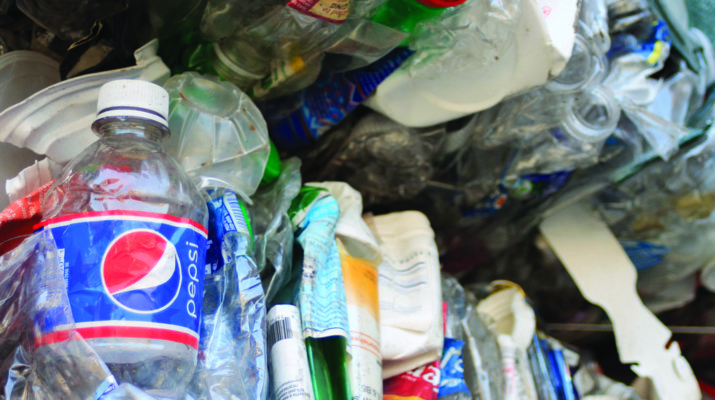Interstate or Sandhills? Both please. This past November it was Highway 2 down and I-80 back. Last month, the opposite. I gathered information on behalf of Keep Alliance Beautiful on both occasions and also had the opportunity to hear from Danielle Easdale of Firstar Fiber, Inc. The latter presentation, “Reducing the Threat of Plastics,” opened the second day of the Keep Nebraska Beautiful (KNB) Conference.
In the fall of 2020, I and other Keep Alliance Beautiful staff members toured Firstar’s Omaha facility. While hearing about the enormous building then, Easdale explained Firstar would soon be adding a production line for the Hefty Energy Bag program. One of the highlights a few weeks ago at the conference was hearing how close they are to making plastic lumber from the bags’ contents and other inputs.
Before Easdale began, the projector displayed what appeared to be an expansive landfill of plastic with the subhead: creating value for hard-to-recycle plastics through integrated systems. She noted the plastic markets really crashed about two to three years ago, adding that during 2018 in the United States of the 35.7 million tons of municipal waste produced Americans recycled 8.7 percent of the plastic.
The myth she said, “(is) there’s no markets for recycled plastics. Not true. We can’t keep up with demand. Brand companies are becoming more responsible for waste their products create. A lot are working on changes in their packaging.” A potato chip maker, for example, may drop off a new bag at the Omaha plant and make sure it makes it through the recycling process. That bag is one of the “other” plastics contained in Hefty Energy Bags — usually non-container, non-traditional No. 1-7 or no-number items. Since the orange bag program began with 6,000 households in West Omaha households in 2016, Firstar has collected them and processed the contents to be turned into new materials elsewhere. Easdale said they are “demonstrating all plastics are resources worthy of recovery into the economic stream,” in regard to her company’s 4- to 5-year project to create production lines from orange bags in-house.
Phase 1 has been a plastic pre-processing facility PRF) where workers sort, blend and process a wide range of hard to recycle plastic resins into a feedstock, she explained. The resin blend will include orange bag contents as well as agriculture plastics collections programs, such as lick tubs, grain bags, seed totes and others. Firstar plans to produce 700,000 linear feet of plastic lumber boards per year. At the end of its life the 100-year decks can be shredded up and recycled again, Easdale observed. “(We) hope to demonstrate this is something we can easily replicate across the U.S. — Nebraska will be the first.”
Phase 2 will be an expansion of the PRF to add an additional 10,000 tons per year. The original idea, she said, was pyrolysis to produce biodiesel. However, technology has advanced enough that Firstar will be going out for requirements for proposals to a lot of different companies to gauge demand. “Super excited about that . . . to see what comes in and what is the most economic and environmentally profitic,” Easdale said.
The area KAB serves will provide part of the resins for Omaha’s plastic lumber. Looking just at Hefty Energy bags, Firstar gathers 30 tons a month with the average bag weighing a pound. Orange bag bales leaving KAB have increased from 585 pounds per quarter since collection began here in 2019 to a high of 2,298 pounds in the first quarter of this year. Other plastics from ag are also a largely untapped resource in the Panhandle and western Sandhills.
Rural Nebraska residents may be more willing to recycle if they can see the fruit of their efforts. “What can we do for end markets to set up here? That’s why we’re becoming an end market ourselves,” Easdale said.

